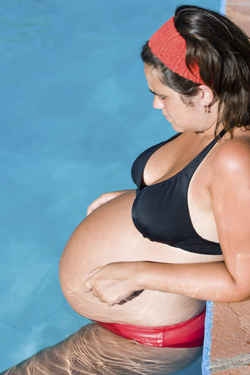
Summer is the time for relaxing pursuits like lounging poolside and sipping margaritas—virgin, of course!—but it also poses some unique risks to pregnant women. Before you hit the beach or pack that picnic basket, refresh your summer smarts with these basic guidelines.
Keep your cool. Hot weather becomes more than just a comfort issue when you’re pregnant. “Significantly elevated body temperatures have been linked to birth defects and miscarriage, especially in the first trimester,” says Nancy Jasper, M.D., assistant clinical professor of obstetrics at Columbia University in New York City. Overheating can rarely lead to heat stroke, but more often causes dizziness or fainting. “When you’re hot, blood goes to the skin to cool you off, which can drop your blood pressure,” says Marjorie Greenfield, M.D., an ob/gyn and associate professor at MacDonald Women’s Hospital in Cleveland and the author of The Working Woman’s Pregnancy Book.
To keep your core temperature low, wear light clothing, dress in layers, and move into a cooler environment if you get too hot. And if you feel lightheaded, sit down immediately and drink juice or water. Drinking fluids keeps you cool and protects against dehydration, which can cause contractions and preterm labor. Aim for six to eight glasses daily. “I kept at least one bottle of water with me at all times,” says Nicole Burton, a Munford, TN, native and mom to 6-month-old Hannah. “There was one in my car, at my desk at the office, even one in my purse!”
When it comes to getting sun, “tanning does not pose a risk to the pregnancy,” says Jasper. Still, it isn’t a good idea. Sun exposure can worsen melasma, dark patches of skin that can last for months or even years. Apply sunscreen frequently, (for suggestions, see ”You’re Covered”) wear hats, and stay under that beach umbrella.
Eat right. Some typical summer foods are actually on the off-limits list when you’re pregnant, while others can pose a danger if they aren’t prepared correctly. Says Jeanna Thompson of Moreno Valley, CA, mom to 5-month-old Barrett, “At barbecues, every time I handled raw meat, I washed my hands thoroughly at least twice before doing anything else.” That’s because uncooked meats may contain the parasite toxoplasma, which can cause blindness and brain damage if passed to the baby. And ready-to-eat meats, including hot dogs, can be infected with bacteria called listeria, which has the potential to cause miscarriage or stillbirth.
To stay clear of food-borne dangers, grill meat, chicken, and fish until steaming hot and avoid deli meats and soft cheeses, advises the U.S. Food and Drug Administration’s Center for Food Safety and Applied Nutrition. Discard food left out for more than two hours, and reduce that time to one hour on days when the Fahrenheit climbs above 90 degrees.
Play safe. As long as you take basic cautions, most summer fun is safe during pregnancy. Swimming, golf, and even running, if you’re experienced, are great ways to enjoy the outdoors. There are a few sports you should steer clear of, however. In the second and third trimesters, avoid anything that could cause you to fall on your belly, such as rollerblading or horseback riding. Skip activities with abrupt stops and starts, such as roller coasters. And avoid waterskiing, jet skiing, and wakeboarding, even in the first trimester. Lake water can be forced up into your blood stream during a fall, which could put the baby—and you—at risk, Greenfield warns.
Be bug-free. Mosquitoes are one of summer’s most irritating aspects, and they can also carry dangerous diseases. Even though it’s best to avoid chemicals when you can during pregnancy, a study published in The American Journal of Tropical Medicine and Hygiene found that insect repellants containing DEET are safe for pregnant women after the first trimester.
Plus, the risk of contracting an illness, such as West Nile virus, from a mosquito bite outweighs any risk of using bug spray, according to Greenfield. Wear long sleeves and pants when possible, and spray most of the repellant on your clothes, not your skin. Natural products containing citronella oil can be used in the first trimester, Jasper says, but you’ll need to reapply the oil every 30 to 60 minutes to maintain effectiveness.
• Get in the swim. “Water cools you and helps with swelling toward the end of pregnancy,” Greenfield says. If you don’t have a pool or lake nearby, pick up an inexpensive infant pool, grab a good book, and take a mini dip in your own backyard.
• Have your toes done. You may not be able to see your feet, but you can still get a relaxing pedicure in ventilated, air–conditioned comfort. Nail painting is safe because the chemicals aren’t absorbed through the nail, Greenfield says. But always make sure the salon knows you’re pregnant, so any necessary accommodations can be made.
• Make your own cooling treat. Cold food and creamy textures have more appeal when you’re pregnant, hot, and craving. Try this easy frozen popsicle recipe or make ice cream from scratch (go with an eggless recipe or use pasteurized eggs—just to be safe).
— Kyla Steinkraus
Kyla Steinkraus spent her summer pregnancy lounging on her father-in-law’s boat while her husband “learned” to wake board. Steinkraus has written for Mothering, Chicago Parent, and Dallas Child.


Leave a Reply